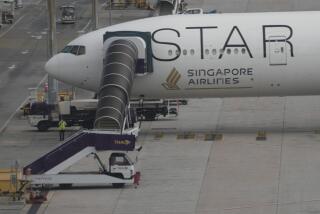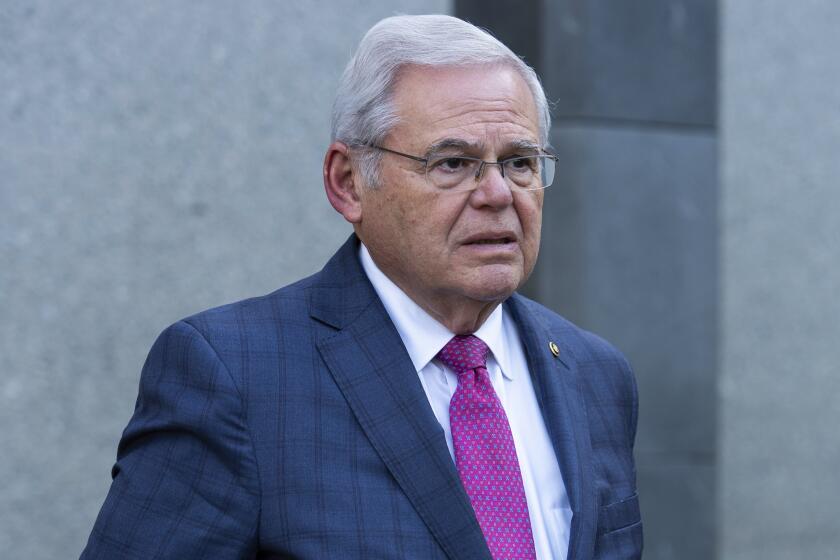Clinton Says Next Peace Move in Mideast Is Up to Syria
President Clinton and a visiting Egyptian President Hosni Mubarak, clearly stung by Syria’s refusal to rejoin talks with Israel, insisted Tuesday that they will not give up on the Middle East peace process, but Clinton said the next move is up to Syria.
“The ball is in his court now,” Clinton said of Syrian President Hafez Assad, who during a meeting Sunday in Geneva rebuffed Clinton’s appeal to reopen stalled negotiations.
Mubarak, a frequent go-between in Arab-Israeli peacemaking, acknowledged that there was “no progress between the Israelis and the Syrians.” But, he added before a one-hour White House meeting with Clinton, “that doesn’t make us pessimistic.”
Clearly, Assad dashed what had been a building optimism that Israel and Syria were on the verge of ending a formal state of war that has lasted half a century. But Middle East experts say the Syrian president is an extremely cautious negotiator who has made a career of frustrating mediators from the United States and elsewhere. The experts say Assad never agrees to anything until he is sure the conditions are perfect.
U.S. officials say an Israeli-Syrian peace deal is still possible this year, although they admit that they don’t know how to bring Assad back to the table.
With the Israeli-Syrian track at an impasse, U.S. mediators have turned to Israel’s talks with the Palestinians on a final peace agreement to settle the two sides’ conflicting claims to the Holy Land. Israeli and Palestinian negotiators wrapped up a week of talks at a Washington air base Tuesday and headed home for consultations. They agreed to resume meetings in Washington on April 6.
U.S., Israeli and Palestinian delegates refused to discuss details of the talks. But all sides insisted that the meetings were useful and productive.
“I think you will continue to see progress at least on the Palestinian track,” Clinton said in his brief joint appearance with Mubarak.
“We believe that these talks were successful in achieving a real exchange of ideas and a greater and deeper understanding of the needs and requirements by each side of the other side,” State Department spokesman James B. Foley said. “The atmosphere was extraordinarily collegial.”
An Israeli source said: “These talks are not, by themselves, going to bring a breakthrough. What was discussed this week were areas of agreement and disagreement. The idea was to go over all the stuff to prepare the issues for a summit of [Israeli Prime Minister Ehud] Barak and [Palestinian Authority President Yasser] Arafat.” Only Barak and Arafat can make binding agreements, he said.
The United States and Israel hope to complete at least one Middle East peace treaty before Clinton leaves office Jan. 20. Their strategy calls for Israel to concentrate on the track that shows the most promise.
U.S. and Israeli officials say agreement with either the Syrians or the Palestinians is possible, although all sides will have to accede to compromises they now are reluctant to make.
The issues in the Syrian talks appear easier--a straightforward land-for-peace swap in which Israel would return the Golan Heights to Syria in exchange for diplomatic relations, ironclad security guarantees and a binding agreement on water rights. But the animosity between Israel and Syria has produced a stalemate even though many of the substantive disputes have been resolved.
On the Palestinian track, the issues are extremely difficult: borders, the future of Jewish settlements, the status of Palestinian refugees and the most emotional matter of all, Jerusalem, which is claimed by both sides. But the bargainers appeared to get along reasonably well.
“These negotiators have gotten to know each other so well, have gotten to understand each other and, indeed, sympathize with each other,” Foley said.
Reacting to the failure of Clinton’s meeting with Assad, the government-controlled Syrian press said the United States must do more to persuade Israel to meet Syria’s terms.
“We hope that American efforts would not be restricted to sending messages back and forth,” said Tishrin, the official Syrian newspaper. The English-language Syria Times suggested that a visit by a “high-ranking U.S. official to the region may help break the ice.”
More to Read
Start your day right
Sign up for Essential California for news, features and recommendations from the L.A. Times and beyond in your inbox six days a week.
You may occasionally receive promotional content from the Los Angeles Times.






